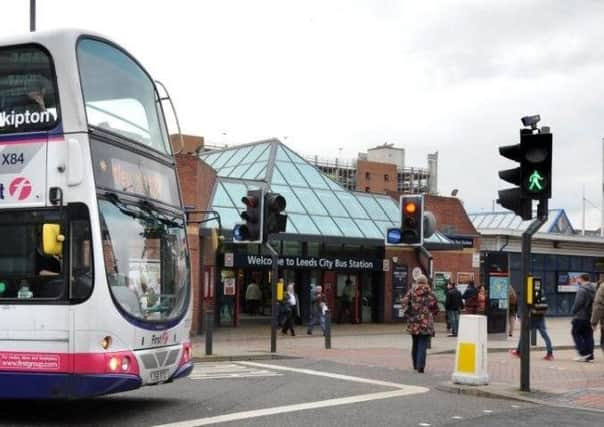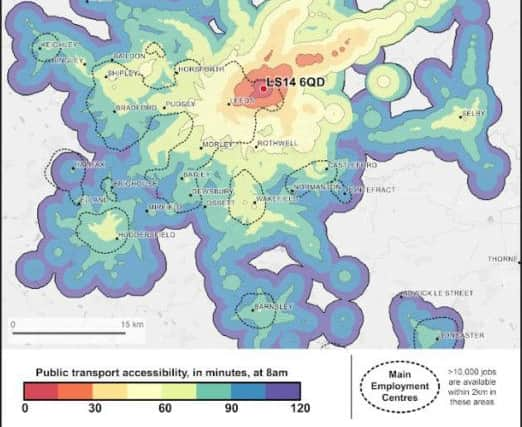Leeds job seekers '˜locked out' of employment by unreliable bus services


The Joseph Rowntree Foundation (JRF) said public transport was “holding back” low-income families from achieving a better standard of living.
Advertisement
Hide AdAdvertisement
Hide AdTransport was consistently highlighted as a “significant barrier” to work once the trade-off between the cost, reliability and speed of local public transport; and the prospect of low-wage, insecure work was considered, researchers from the University of Sheffield and Sheffield Hallam University found.


The study examined six areas in the North of England and Scotland, including Seacroft in Leeds and Dewsbury Moor in Kirklees, and found the unreliability of local buses risked creating ‘cut-off commuter zones’ where people were unable to consistently guarantee punctuality when travelling to work; and that even when residents were willing to commute long distances, reliable services were not always available.
A “disconnect” between the location of jobs and low-income areas was also constraining people’s ability to seize opportunities when they arise, with jobs for low-paid, unskilled and manual work tending to be based at out-of-town, locations poorly served by public transport.
Action by the Government, combined and local authorities and transport bodies on bus franchising, planning and policy is needed to overcome transport barriers to employment, the JRF said. Acting head of policy and research, Brian Robson, said: “The experiences of low-income residents make it abundantly clear that we must properly invest in transport networks within cities not just between them.”
Advertisement
Hide AdAdvertisement
Hide AdWest Yorkshire Combined Authority said it spends £17m a year on non-profitable bus services and is set to invest £195m this year on transport and economic schemes designed “to support inclusive economic growth, new jobs, better access to training and skills”.
Coun Kim Groves, chair of the authority’s transport committee said it would continue to push bus companies to provide affordable fares.
A Department for Transport spokesperson said it would spend £13bn until 2020 to “transform” transport across the North.
‘You haven’t got a car - tough’
The researchers spoke to people in Seacroft and Dewsbury Moor for their experiences of bus travel.
Advertisement
Hide AdAdvertisement
Hide AdOne 49-year-old man from Seacroft told them: “They have tons of work, big industrial estate, but there’s no bus service, it’s about 13 miles away. I do not understand why they build a big estate where there’s no transport, that’s like tough, if you haven’t got a car.”
A woman from Dewsbury Moor, 59, said wages for the types jobs she is going for would be “wiped out” in bus fares. “By the time I’ve paid for travel expenses, it wouldn’t be worth my while travelling that far.”
Despite being just over four miles from the city centre, researchers found it took more than 30 minutes to get into Leeds from Seacroft.
Labour’s Leeds East MP Richard Burgon, whose constituency includes Seacroft, said: “Too much of our transport system is run to fill the pockets of fat cats rather than to serve the needs of our communities.
Advertisement
Hide AdAdvertisement
Hide Ad“When profits rather than public service are put first it’s no surprise it’s the public that suffers. “The recommendations of this important report should be supported.
“Local councils and local communities should be allowed to properly own and run their own bus services, so that local people not big business can decide what’s needed and so that passengers and the needs of our communities can be put first.”
In Dewsbury Moor, the study showed none of the nearby major employment centres were reachable within an hour by bus. While, in theory, it Leeds city centre was reachable in 45 minutes, the reality was a journey of almost an hour.
Labour MP for Dewsbury, Paula Sherriff said the report “starkly exposes the social cost of reduced, unreliable services and rip-off fares”. She said bus fares had risen three times faster than wages since 2010, and said bus fares, routes and timetables needed to be placed back under local authority control. Rail services should also be put under public ownership.
“It’s time for communities to be put ahead of the interests of private profit,” she added.